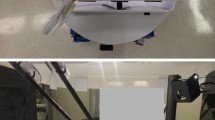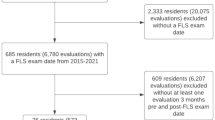Abstract
Background
The Fundamentals of Laparoscopic Surgery® (FLS) certification exam assesses both cognitive and manual skills, and has been administered for over a decade. The purpose of this study is to report results over the past 9 years of testing in order to identify trends over time and evaluate the need to update scoring practices. This is a quality initiative of the SAGES FLS committee.
Methods
A representative sample of FLS exam data from 2008 to 2016 was analyzed. The de-identified data included demographics and scores for the cognitive and manual tests. Standard descriptive statistics were used to compare trends over the years, training levels, and to assess the pass/fail rate.
Results
A total of 7232 FLS tests were analyzed [64% male, 6.4% junior (postgraduate year—PGY1–2), 84% senior (PGY3–5), 2.8% fellows (PGY6), and 6.7% attending surgeons (PGY7)]. Specialties included 93% general surgery (GS), 6.2% gynecology, and 0.9% urology. The Pearson correlation between cognitive and manual scores was 0.09. For the cognitive exam, there was an increase in scores over the years, and the most junior residents scored the lowest. For the manual skills, there were marginal differences in scores over the years, and junior residents scored the highest. The odds ratio of PGY3+ passing was 1.8 (CI 1.2–2.8) times higher than that of a PGY1–2. The internal consistency between tasks on the manual skills exam was 0.73. If any one of the tasks was removed, the Cronbach’s alpha dropped to between 0.65 and 0.71, depending on the task being removed.
Conclusion
The cognitive and manual components of FLS test different aspects of laparoscopy and demonstrate evidence for reliability and validity. More experienced trainees have a higher likelihood of passing the exam and tend to perform better on the cognitive skills. Each component of the manual skills contributes to the exam and should continue to be part of the test.
Similar content being viewed by others
References
Peters JH, Fried GM, Swanstrom LL, Soper NJ, Sillin LF, Schirmer B, Hoffman K, the Sages FLS Committee (2004) Development and validation of a comprehensive program of education and assessment of the basic fundamentals of laparoscopic surgery. Surgery 135:21–27
Vassiliou MC, Dunkin BJ, Marks JM, Fried GM (2010) FLS and FES: comprehensive models of training and assessment. Surg Clin N Am 90:535–558
Vassiliou MC, Ghitulescu GA, Feldman LS, Stanbridge D, Leffondré K, Sigman HH, Fried GM (2006) The MISTELS program to measure technical skill in laparoscopic surgery: evidence for reliability. Surg Endosc 20:744–747
Fried GM, Feldman LS, Vassiliou MC, Fraser SA, Stanbridge D, Ghitulescu G, Andrew CG (2004) Proving the value of simulation in laparoscopic surgery. Ann Surg 240:518–525
Fried GM (2008) FLS assessment of competency using simulated laparoscopic tasks. J Gastrointestinal Surg 12:210–212
Scott DJ, Ritter EM, Tesfay ST, Pimentel EA, Nagji A, Fried GM (2008) Certification pass rate of 100% for fundamentals of laparoscopic surgery skills after proficiency-based training. Surg Endosc 22:1887–1893
Fraser SA, Klassen DR, Feldman LS, Ghitulescu GA, Stanbridge D, Fried GM (2003) Evaluating laparoscopic skills: setting the pass/fail score for the MISTELS system. Surg Endosc 17:964–967
Okrainec A, Soper NJ, Swanstrom LL, Fried GM (2011) Trends and results of the first 5 years of Fundamentals of Laparoscopic Surgery (FLS) certification testing. Surg Endosc 25:1192–1198
Swanstrom LL, Fried GM, Hoffman KI, Soper NJ (2006) Beta test results of a new system assessing competence in laparoscopic surgery. JACS 202:62–69
Derossis AM, Fried GM, Abrahamowicz M, Sigman HH, Barkun JS, Meakins JL (1998) Development of a model for training and evaluation of laparoscopic skills. Am J Surg 175:482–487
Acknowledgements
We would like to thank Carla Bryant, Christelle Menetrier, and all of the SAGES FLS staff for their help in conducting this study.
Author information
Authors and Affiliations
Corresponding author
Ethics declarations
Disclosures
This is a quality initiative of the SAGES FLS committee. Steinberg-Bernstein Centre for Minimally Invasive Surgery and Innovation received an unrestricted educational grant from Covidien Canada. Elif Bilgic, Pepa Kaneva, Allan Okrainec, E. Matthew Ritter, Steven D. Schwaitzberg, Melina C. Vassiliou have no conflicts of interest or financial ties to disclose.
Rights and permissions
About this article
Cite this article
Bilgic, E., Kaneva, P., Okrainec, A. et al. Trends in the Fundamentals of Laparoscopic Surgery® (FLS) certification exam over the past 9 years. Surg Endosc 32, 2101–2105 (2018). https://doi.org/10.1007/s00464-017-5907-0
Received:
Accepted:
Published:
Issue Date:
DOI: https://doi.org/10.1007/s00464-017-5907-0




